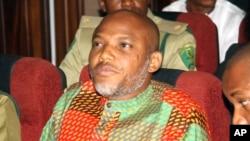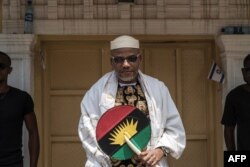Kanu, a British citizen who leads the banned Indigenous People of Biafra (IPOB) movement, disappeared from Nigeria after skipping bail in 2017. He was arrested in Kenya in 2021 and charged in Nigeria with terrorism.
In December, Nigeria's Supreme Court overturned a judgement by a lower court that dropped the terrorism charges against Kanu, setting the stage for his trial to commence.
"I will respond to all charges and the court will see that they are all lies," Kanu told the court.
Judge Murtala Nyako adjourned the case to April 17 to start trial.
Nyako also denied a request by Kanu, currently in the custody of the Department of State Services (DSS), a security agency, to be transferred to a regular prison on health grounds. He told the court he has congenital heart disease.
Kanu has previously denied the terrorism charges and knowingly broadcasting falsehoods, which are linked to social media posts he issued between 2018 and 2022.
His lawyers have argued that he could not receive a fair trial in Nigeria because he was forcefully extradited from Kenya. Kenya has declined to say if it played a role in Kanu's return.
Kanu's IPOB campaigns for the secession of southeastern Nigeria where the majority belong to the Igbo ethnic group. Nigerian authorities have labelled IPOB a terrorist organization.
An attempt by the southern region to secede as the Republic of Biafra in 1967, the year Kanu was born, triggered a three-year civil war that killed more than 1 million people.














Forum